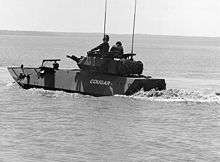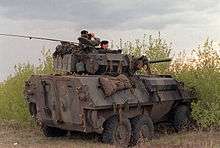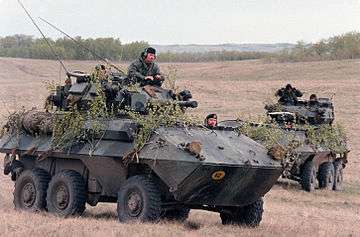AVGP
| AVGP | |
|---|---|
|
A pair of Canadian Cougars | |
| Type | Armoured fighting vehicle |
| Place of origin | Canada |
| Service history | |
| In service | 1976–present |
| Used by | See Users |
| Production history | |
| Number built |
Cougar – 195[1] Grizzly – 274[1] Husky – 27[1][2] |
| Variants | See Variants |
| Specifications | |
| Weight | 10.7 t |
| Length | 5.97 m |
| Width | 2.50 m |
| Crew |
Cougar: 3 (Commander, gunner and driver, 2 soldiers in rear of vehicle) Husky: 2 (Driver and technician) Grizzly: Commander, gunner and driver, 6 soldiers in rear |
|
| |
Main armament |
Cougar: 76 mm L23A1 gun (fires HESH, Smoke BE (base ejected), and Canister rounds)[3] Grizzly: 12.7mm heavy machine gun and a 7.62 mm machine-gun (C6) and 66 mm smoke grenade launchers (2 clusters of 4 launchers)[1] Husky: 7.62 mm machine gun (C6) and 66 mm smoke grenade launchers (2 clusters of 4 launchers)[2] |
Secondary armament | Cougar: 7.62 mm machine gun (C6) and 66 mm smoke grenade launchers No 12 (2 clusters of 4 launchers)[3] |
| Engine | 275 hp Detroit Diesel 6V53T two-cycle turbo-charged diesel |
| Suspension | 6×6 |
| Speed | 100 km/h |
The AVGP (Armoured Vehicle General Purpose) is a series of three armoured fighting vehicles ordered by the Canadian military in 1977.[4][5][6][7] The vehicles, which are the Grizzly, Cougar and Husky, were based on the six-wheeled version of the Swiss MOWAG Piranha I.
The Canadian Army retired all AVGP variants beginning in 2005; however, a number of the retired vehicles were transferred to other militaries and police forces, where they continue to serve.[6][8]
The AVGP had propellers and trim vanes for amphibious use, like the eight-wheeled Bison, which was the vehicle family's immediate successor. Recent retrofits have removed the marine drive system, as it was seldom used and maintenance was costly. The Canadian Army's LAV III, the United States Marine Corps' LAV-25, and the US Army's Stryker are other variants of the Piranha family, and directly evolved from the Canadian designs.
History
Canada


The AVGP variants were introduced into Canadian service in the late 1970s.[4] Intended for use only in Canada, they were pressed into service for several United Nations missions, including UNPROFOR and the mission to Somalia. One Grizzly was captured by Serb forces in the late 1990s, despite it being present on a peace keeping mission.[9]
The Cougar was used for training in Canada as a reconnaissance vehicle.[5] During the 1980s and 1990s, it was used by armoured units as a fire support vehicle, for those units not equipped with the Leopard tank. The squadrons equipped with the Cougar in those regiments were humorously referred to as the "boat squadron" as opposed to the reconnaissance squadrons, which were equipped with the Lynx, and later the Coyote (another AVGP successor).
The Grizzly was used as an armoured personnel carrier in regular force infantry battalions not equipped with the M113 APC, and also by reserve units. The majority of vehicles had their marine propulsion systems removed. Under the Wheeled LAV Life Extension project, the Canadian Forces planned to convert Grizzly and Husky vehicles to support variants, such as Command Post and Mobile Repair Team Vehicle. However, the project was cancelled in 2005, and the vehicles retired.[6][7][10]
In May 2007, the Edmonton Police Service accepted the donation of a disarmed Grizzly from the Canadian Army.[11]
In March 2010, the Canadian Army donated two disarmed Cougar AVGPs to the Royal Canadian Mounted Police in British Columbia for use by the Emergency Response Team. They were retrofitted to transport ERT assault teams into hazardous areas where transport in unarmoured vehicles would not be safe.
In April 2014, the department of National Defence donated a Cougar AVGP to the Windsor Police Service in Windsor, Ontario.
Use in Africa
In June 2005, the Canadian government announced plans to loan 105 AVGPs (100 Grizzlys and 5 Huskys) to African peacekeepers in the Darfur region of Sudan.[12][13] The AVGP was considered sufficiently modern to be useful in this low-intensity conflict. Canada planned to arrange for civilian contractors to maintain these vehicles. As the vehicles contained some U.S.-manufactured or licensed parts, U.S. permission would be required to loan the vehicles. Initially, the vehicles were to be shipped without their Cadillac-Gage turrets. The vehicles arrived in Senegal in the late summer of 2005.[14][15]
The Sudanese government required various kinds of assurances before they would allow peacekeepers to use the vehicles in Sudan. On November 18, 2005 the vehicles started arriving in Sudan, in white livery, with their turrets.[16] The loan of vehicles for peace-keeping service in Sudan was originally for one year.[14][15]
However, the loan was extended, and transferred from the African Union to the United Nations. According to Amnesty International, the soldiers who used the loaned vehicles served in Sudan for too short a term to be properly trained, and become experienced. One of the vehicles was destroyed by a rocket-propelled grenade.[14] A second vehicle was damaged when it rammed a more heavily armed, but unarmored Technical vehicle.
Uruguay
In 2008, the Uruguayan Army bought 44 surplus Cougars from the Canadian Army.[17][18] They were rebuilt without the turret by the Chilean MOWAG-Piranha builder FAMAE, as they will act as armoured personnel carriers for the UN deployment in the Republic of Congo (MONUC), and domestically.
In 2009, Uruguay bought 98 Grizzlys and 5 Huskys that were on loan with the AMIS/UNAMID mission in Darfur.
Variants
Variants of the AVGP are:[1]
Cougar
- Used as a tank trainer, reconnaissance and fire support vehicle[5]
- Three-man crew[5]
- Turret of a British Scorpion reconnaissance vehicle (76mm main gun)[5]
Grizzly
- Armoured personnel carrier (APC)[6]
- Three-man crew[6]
- Designed to carry a section of infantry[6]
- Mounting a Cadillac-Gage 1 metre turret, armed with a .50 BMG and a 7.62 mm machine gun[6][19]
Husky
- Armoured recovery vehicle (ARV)[7]
- Two-man crew[7]
- Designed to provide mechanical support for the other two vehicles[7]
Operators

Current operators
-
 Canada (Royal Canadian Mounted Police) – as the Tav 2 variant (Cougars modified for ERT tasks), these were given for free by the Canadian Army to the RCMP in British Columbia in March 2010. The Edmonton Police Service received one Grizzly in 2007. Formerly operated by the Canadian Army.
Canada (Royal Canadian Mounted Police) – as the Tav 2 variant (Cougars modified for ERT tasks), these were given for free by the Canadian Army to the RCMP in British Columbia in March 2010. The Edmonton Police Service received one Grizzly in 2007. Formerly operated by the Canadian Army. - African Union (AMIS mission) – 100 (−1 lost in combat) Grizzlys, 5 Huskys[20]
-
 Uruguay – 44 refurbished Cougars with turrets removed.[8] 98 Grizzlys and 5 Huskys given directly from the AMIS/UNAMID mission in Sudan.
Uruguay – 44 refurbished Cougars with turrets removed.[8] 98 Grizzlys and 5 Huskys given directly from the AMIS/UNAMID mission in Sudan.
See also
References
- 1 2 3 4 5 "Grizzly AVGP". Department of National Defence. Retrieved 2008-12-10.
- 1 2 "Husky". Department of National Defence. Retrieved 2008-12-10.
- 1 2 "Cougar". Department of National Defence. Retrieved 2008-12-10.
- 1 2 "Background – Armoured Vehicle, General Purpose – 6x6 AVGPs". Canadian American Strategic Review. September 2009. Archived from the original on 2009-10-03.
- 1 2 3 4 5 "Background – Armoured Vehicle, General Purpose – Cougar DFSV". Canadian American Strategic Review. September 2009. Archived from the original on 2009-10-03.
- 1 2 3 4 5 6 7 "Background – Armoured Vehicle, General Purpose – the Grizzly ISC". Canadian American Strategic Review. September 2009. Archived from the original on 2009-10-03.
- 1 2 3 4 5 "Background – Armoured Vehicle, General Purpose – the Husky ARV". Canadian American Strategic Review. September 2009. Archived from the original on 2009-10-03.
- 1 2 "AVGPs and the Wheeled LAV Life Extension Project". Canadian American Strategic Review.
- ↑ Frank Kuschnereit. "Photos of vehicle". Archived from the original on 2009-10-24.
- ↑ "Archived copy". Archived from the original on 2009-02-11. Retrieved 2009-01-07.
- ↑ "Tactical". Edmonton Police Service. Archived from the original on 16 October 2011. Retrieved 15 October 2011.
- ↑ "Canadian tanks muscle AU forces". Sudan Tribune. 2005-11-21. Retrieved 2008-12-10.
- ↑ "Background — CF AVGPs for the African Union Mission in Sudan". Canadian American Strategic Review. Archived from the original on 2009-10-03.
- 1 2 3 "Background — AVGPs in Africa — Grizzlys and Huskys for Darfur". Canadian American Strategic Review. October 2009. Archived from the original on 2009-11-01.
- 1 2 "UNAMID UPDATE: TIME FOR EFFECTIVE ACTION". Amnesty International. 2008-02-07. Archived from the original on 2009-11-01.
- ↑ Paul Koring (November 15, 2005). "Armoured vehicles approved for Sudan". Globe and Mail. Archived from the original on 2007-03-10. Retrieved 2007-03-04.
- ↑ "Pan American Defence Online" (in Spanish). Archived from the original on July 12, 2009. Retrieved 2008-12-10.
- ↑ "Background – AVGPs and the Wheeled LAV Life Extension Project". Canadian American Strategic Review. October 2009. Archived from the original on 2009-11-01.
- ↑ "Cadillac Gage 1-Meter Crewed Turret". Canadian American Strategic Review. Archived from the original on 2009-04-03.
- ↑ "AVGPs in Africa — Grizzlys and Huskys for Darfur". Canadian American Strategic Review. Archived from the original on 2009-11-01.
